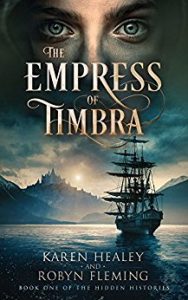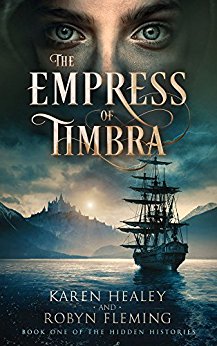Liz Bourke Reviews The Empress of Timbra by Karen Healey & Robyn Fleming
 The Empress of Timbra, Karen Healey & Robyn Fleming (self-published 978-0-473-42716-0, $4.99, ebook). February 2018. Cover art by Damonza.
The Empress of Timbra, Karen Healey & Robyn Fleming (self-published 978-0-473-42716-0, $4.99, ebook). February 2018. Cover art by Damonza.
The Empress of Timbra, co-authored by Robyn Fleming & Karen Healey (Guardian of the Dead, While We Run), turns out to be an unexpected delight. Its publication was funded through Fleming and Healey’s Kickstarter campaign, but it’s now widely available as an ebook. While Healey’s solo form is in YA, this first offering from the Healey-Fleming team, while certainly YA-friendly, feels a lot more like epic fantasy: the epic fantasy of yesteryear, where young people go out into the world and make a place for themselves in it.
When 14-year-old Taver’s fisherman father dies, his mother takes him to the palace of Vatadania, the Empress of Timbra. There, he learns that his blood father is Baron Arkelga Tuvari, a wealthy and important nobleman. His mother, pressed by poverty, asks for the Baron’s help – and Taver is forced to deal with having his world, and his self-image, upended. Fourteen is an emotional age, and being suddenly confronted with these changes does nothing for Taver’s emotional equilibrium. Though the Baron accepts Taver as the son of his blood, he doesn’t – at least at first – acknowledge him openly, instead finding Taver an apprenticeship with a master smith in the palace and finding Taver’s mother a place in the kitchens.
In Tuvari’s household, Taver meets his younger sister, 12-year-old Lady Elain. Elain is Tuvari’s acknowledged daughter by the Empress’s advisor and seer, Hialye Cazol – but still not a legitimate child. Elain’s mother is expecting another child by the Baron, and Elain’s routine is a little disrupted – and she’s always wanted a friend that she could trust. Taver and Elain forge a friendship complicated by Taver’s ambivalent status within Tuvari’s household, but one that grows stronger with time.
As a smith’s apprentice, Taver has to deal with the bullying and resentment of the other apprentices, who see him as an outsider who needs to be kept in his place. Meanwhile, his own ambivalence regarding his blood father makes him awkward and uncertain.
Elain’s secure in her position in her mother’s household, and her father’s. She doesn’t have Taver’s ambivalence, and she’s learning politics, and magic, and the constraints that govern women’s use of what is called the Art. There are ideological constraints on women’s use of magic, and deep rifts in society that surround the last empress and her transgressive use of the Art.
What Taver doesn’t realise – and what Elain’s surprised she has to tell him – is that Baron Arkelga Tuvari is the Empress’s cousin. Tuvari is one of only a handful of scions of the royal family to survive the civil war and political unrest that attended Vatadania’s ascension to the throne. Tuvari’s the son of the previous empress – the empress known as Dania the Usurper – and the only one of Vatadania’s close relatives who may still produce heirs of his own. With Vatadania engaged in negotiations for her marriage, and political machinations in train by people who dislike the her policies, reforms, and potential choice of husband, when Tuvari acknowledges Taver, a whole heap of complications fall on Taver’s head. Both Taver and Elain are pieces on a board that’s bigger – and more complicated – than they know.
The Empress of Timbra is told in alternating chapters from Taver’s and Elain’s points of view. They’re deeply engaging characters, and unreliable narrators – they miss things because of their youth and lack of context, and then the reader sees the pieces come together in compelling ways. Their adventures involve horned horses, childish adventures, dangerous politics, pirates, negotiating awkwardness in a powerful family, and the problems of ethics, power, and human relationships. It’s a very full book – and a fast one, for all its varied pieces, with interesting world building and cool cultural asides. And it closes with some truly entertaining “scholarly” appendices, reflecting on the meat of the novel from centuries in the future.
It’s a good book. I recommend it, and I’m looking forward to reading more from Healey & Fleming in this world.
Liz Bourke is a cranky queer person who reads books. She holds a Ph.D in Classics from Trinity College, Dublin. Her first book, Sleeping With Monsters, a collection of reviews and criticism, is out now from Aqueduct Press. Find her at her blog, her Patreon, or Twitter. She supports the work of the Irish Refugee Council and the Abortion Rights Campaign.
This review and more like it in the April 2018 issue of Locus.
 While you are here, please take a moment to support Locus with a one-time or recurring donation. We rely on reader donations to keep the magazine and site going, and would like to keep the site paywall free, but WE NEED YOUR FINANCIAL SUPPORT to continue quality coverage of the science fiction and fantasy field.
While you are here, please take a moment to support Locus with a one-time or recurring donation. We rely on reader donations to keep the magazine and site going, and would like to keep the site paywall free, but WE NEED YOUR FINANCIAL SUPPORT to continue quality coverage of the science fiction and fantasy field.








